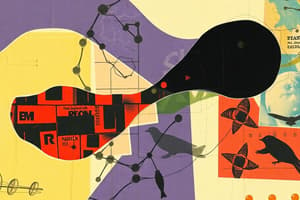Podcast
Questions and Answers
What is the approximate amount of amino acids in a 70-kg man?
What is the approximate amount of amino acids in a 70-kg man?
- 1-2 kg
- 400 g
- 90-100 g (correct)
- 12 kg
In healthy individuals, what is the state of the amino acid pool?
In healthy individuals, what is the state of the amino acid pool?
- In a steady state (correct)
- In a state of deficiency
- In a state of excess
- In a state of flux
What happens to amino acids not used in biosynthetic reactions?
What happens to amino acids not used in biosynthetic reactions?
- They are converted to glucose
- They are burned as a fuel (correct)
- They are excreted
- They are stored in the body
What is the purpose of protein degradation?
What is the purpose of protein degradation?
What determines the concentration of protein in the cell for many proteins?
What determines the concentration of protein in the cell for many proteins?
What happens to the total amount of protein in the body in healthy adults?
What happens to the total amount of protein in the body in healthy adults?
What type of modification can lead to preferential degradation of some proteins?
What type of modification can lead to preferential degradation of some proteins?
What is the significance of N-terminal residues on protein half-life?
What is the significance of N-terminal residues on protein half-life?
What occurs when the carbonyl group of the peptide bond is contributed by arginine or lysine?
What occurs when the carbonyl group of the peptide bond is contributed by arginine or lysine?
What is the significance of PEST sequences in proteins?
What is the significance of PEST sequences in proteins?
What is the function of enteropeptidase?
What is the function of enteropeptidase?
Why must dietary proteins be hydrolyzed in the intestine?
Why must dietary proteins be hydrolyzed in the intestine?
What is the result of enteropeptidase converting trypsinogen to trypsin?
What is the result of enteropeptidase converting trypsinogen to trypsin?
What is the role of cholecystokinin and secretin in pancreatic zymogen release?
What is the role of cholecystokinin and secretin in pancreatic zymogen release?
What is the typical daily intake of protein in the American diet?
What is the typical daily intake of protein in the American diet?
What is an exception to the rule that proteins are too large to be absorbed by the intestine?
What is an exception to the rule that proteins are too large to be absorbed by the intestine?
What is the purpose of synthesizing pancreatic proteases as inactive zymogens?
What is the purpose of synthesizing pancreatic proteases as inactive zymogens?
What is the main function of trypsin in terms of activating other pancreatic zymogens?
What is the main function of trypsin in terms of activating other pancreatic zymogens?
Where are D-amino acids found?
Where are D-amino acids found?
What is the function of D-amino acid oxidase?
What is the function of D-amino acid oxidase?
What is the byproduct of the reaction catalyzed by D-amino acid oxidase?
What is the byproduct of the reaction catalyzed by D-amino acid oxidase?
What is the purpose of glutamine synthetase?
What is the purpose of glutamine synthetase?
What is the fate of glutamine in the liver?
What is the fate of glutamine in the liver?
What is the significance of D-amino acid oxidase activity?
What is the significance of D-amino acid oxidase activity?
What is the purpose of the glucose-alanine cycle?
What is the purpose of the glucose-alanine cycle?
What is the major disposal form of amino groups derived from amino acids?
What is the major disposal form of amino groups derived from amino acids?
Where are the first two reactions of the urea cycle located?
Where are the first two reactions of the urea cycle located?
What is the source of the carbon and oxygen in urea?
What is the source of the carbon and oxygen in urea?
What is the enzyme responsible for the oxidative deamination of glutamate?
What is the enzyme responsible for the oxidative deamination of glutamate?
Where is urea produced and then transported to for excretion?
Where is urea produced and then transported to for excretion?
Flashcards are hidden until you start studying
Study Notes
Amino Acid Pool and Nitrogen Metabolism
- The amino acid pool consists of approximately 90-100 g of amino acids, a small amount compared to the 12 kg of protein in the body of a 70-kg person
- In healthy, well-fed individuals, the input to the amino acid pool is balanced by the output, resulting in a steady state and nitrogen balance
Protein Turnover
- Proteins in the body are constantly being synthesized and degraded to remove abnormal or unneeded proteins
- Regulation of synthesis determines protein concentration in the cell, with degradation playing a minor role for some proteins
- In healthy adults, the rate of protein synthesis is sufficient to replace degraded protein, maintaining a constant total amount of protein in the body
Chemical Signals for Protein Degradation
- Proteins have different half-lives, indicating that degradation is influenced by structural aspects of proteins
- Chemical modifications, such as oxidation or ubiquitin tagging, can mark proteins for degradation
- The nature of the N-terminal residue affects protein half-life, with serine resulting in long-lived proteins and aspartate in short-lived proteins
- Proteins with PEST sequences (proline, glutamate, serine, and threonine) are rapidly degraded
Digestion of Dietary Proteins
- Most nitrogen in the diet comes from protein (70-100 g/day in the American diet)
- Proteins must be hydrolyzed to di- and tripeptides and amino acids for absorption
- Pancreatic proteases, such as trypsin, cleave proteins into smaller peptides and amino acids in the small intestine
Activation of Pancreatic Zymogens
- Pancreatic zymogens are activated by enteropeptidase, an enzyme on the luminal surface of intestinal mucosal cells
- Trypsin, once activated, can convert other trypsinogen molecules to trypsin, creating a cascade of proteolytic activity
Studying That Suits You
Use AI to generate personalized quizzes and flashcards to suit your learning preferences.




